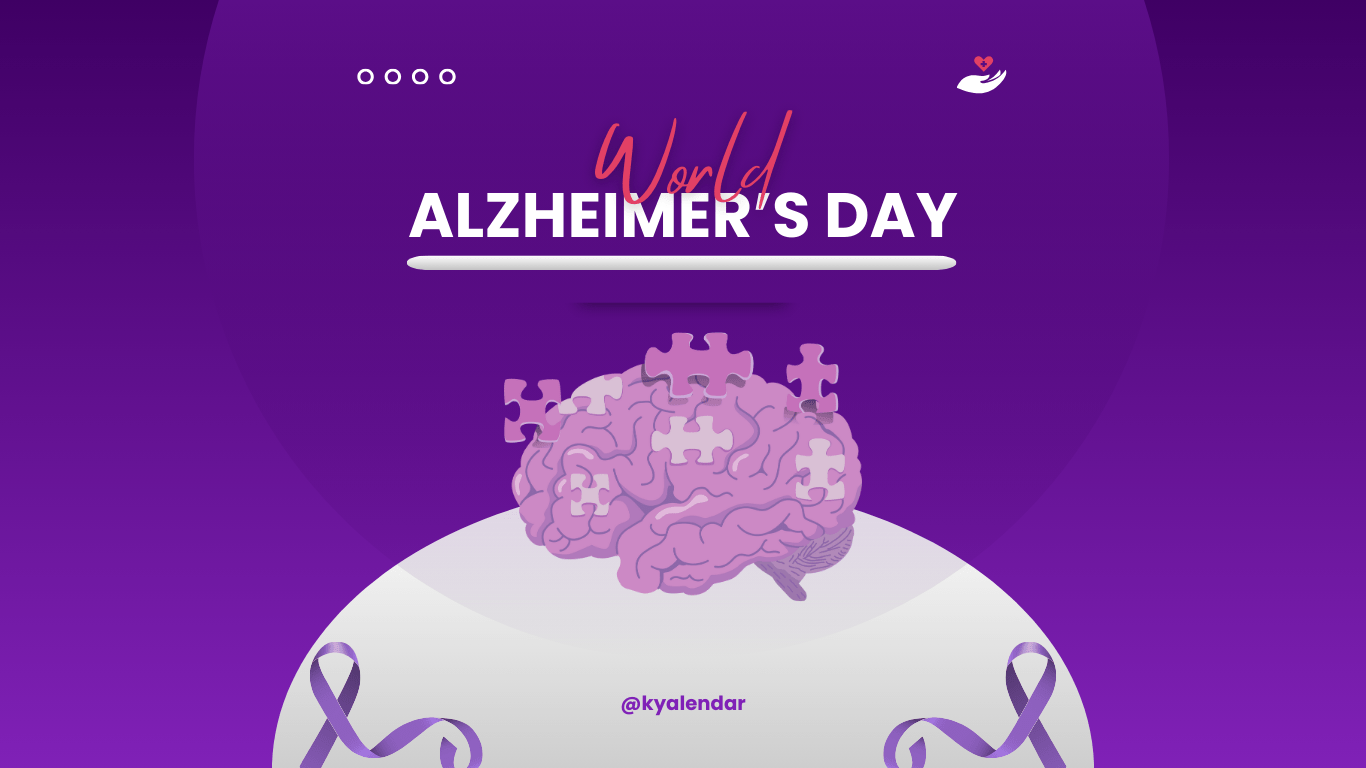
- This event has passed.
World Alzheimer’s Day
September 21

World Alzheimer’s Day, observed annually on the 21st of September, is a significant global event dedicated to raising awareness about Alzheimer’s disease and other forms of dementia. This day serves as an opportunity to educate people, challenge the stigma associated with dementia, and encourage support for those affected by the condition.
Understanding Alzheimer’s Disease
Alzheimer’s disease is the most common cause of dementia, a general term for a decline in cognitive ability severe enough to interfere with daily life. It is a progressive neurological disorder that leads to the degeneration and death of brain cells, resulting in memory loss, confusion, and significant changes in behaviour and personality.
The exact cause of Alzheimer’s is still not fully understood, but it is known that a combination of genetic, environmental, and lifestyle factors contribute to its development. The disease primarily affects older adults, with the risk increasing significantly with age. However, Alzheimer’s is not a normal part of ageing, and it can also affect younger individuals in rare cases, known as early-onset Alzheimer’s.
The Importance of World Alzheimer’s Day
World Alzheimer’s Day plays a crucial role in bringing global attention to a condition that affects millions of people worldwide. Alzheimer’s disease has a profound impact not only on those who are diagnosed but also on their families, caregivers, and society as a whole. The day is marked by various activities and events aimed at spreading knowledge, reducing the stigma surrounding dementia, and advocating for better care and support for those affected.
Raising Awareness
One of the primary goals of World Alzheimer’s Day is to raise awareness about the symptoms and challenges of Alzheimer’s disease. Early detection and diagnosis are vital in managing the condition effectively, and increased awareness can help individuals and families recognise the early signs. These may include memory loss, difficulty in performing familiar tasks, confusion with time or place, and changes in mood or behaviour.
Educational campaigns and public events on World Alzheimer’s Day often focus on providing information about these symptoms, encouraging people to seek medical advice if they notice any concerning changes. The day also highlights the importance of ongoing research in understanding Alzheimer’s disease and finding potential treatments or a cure.
Challenging Stigma
Stigma remains a significant barrier for people living with Alzheimer’s disease and their families. Misunderstandings about the condition can lead to social isolation, discrimination, and a lack of support. World Alzheimer’s Day seeks to challenge these negative perceptions by promoting understanding and compassion.
By sharing stories of those affected by Alzheimer’s, both individuals living with the condition and their caregivers, the day helps to humanise the disease and foster empathy. It encourages communities to be more supportive and inclusive, ensuring that people with Alzheimer’s and their families are treated with dignity and respect.
Supporting Caregivers
Caring for someone with Alzheimer’s disease can be incredibly challenging, both emotionally and physically. World Alzheimer’s Day recognises the vital role that caregivers play in the lives of those with dementia. It is a day to show appreciation for their dedication and to highlight the need for better support systems.
Caregivers often face significant stress, and many may neglect their own health and well-being while focusing on the needs of their loved ones. On World Alzheimer’s Day, there is a strong emphasis on providing resources and support for caregivers, including respite care, counselling, and practical advice on managing the demands of caregiving.
Global Efforts and Initiatives
World Alzheimer’s Day is part of World Alzheimer’s Month, a broader campaign that runs throughout September. This global initiative is led by Alzheimer’s Disease International (ADI), a federation of Alzheimer’s associations around the world. The theme for World Alzheimer’s Month changes each year, focusing on different aspects of the disease and its impact.
Around the world, various events and activities are organised to mark World Alzheimer’s Day, including memory walks, educational seminars, fundraising events, and social media campaigns. These activities aim to unite people in the fight against Alzheimer’s, promoting solidarity and collective action.
Promoting Research and Advocacy
Research into Alzheimer’s disease is ongoing, with scientists working tirelessly to uncover the causes, develop treatments, and ultimately find a cure. World Alzheimer’s Day provides an opportunity to advocate for increased funding and support for research initiatives. It also emphasises the importance of clinical trials and the need for more participants to help advance scientific understanding.
In addition to research, advocacy efforts focus on improving policies and services for people with dementia. This includes advocating for better access to care, increased support for families, and the development of dementia-friendly communities.
Conclusion
World Alzheimer’s Day is a crucial platform for raising awareness, challenging stigma, and promoting understanding of Alzheimer’s disease and dementia. As the global population ages, the number of people affected by Alzheimer’s is expected to rise, making it more important than ever to address the challenges posed by the condition.
By educating the public, supporting caregivers, and advocating for research and better services, World Alzheimer’s Day plays a vital role in the global fight against dementia. It reminds us all of the importance of compassion, understanding, and collective action in improving the lives of those affected by Alzheimer’s disease and their families.
Details
- Date:
- September 21